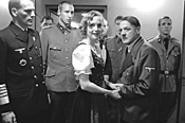Downfall doesn't hold any brief for, say, the lunatic ideologue Joseph Goebbels (Ulrich Matthes) or his icy wife, Magda (Corinna Harfouch), who murders her six children because, she says, "The world after National Socialism is no longer worth living in." And it casts a cold eye on most of the creepy visionaries and brainwashed sycophants hiding downstairs with the boss, as the Red Army swarms over the ruined city.
But the film certainly means to give us a "complete," full-blooded portrait of der Führer on his last legs -- everything from his hysterical, near-comic rants ("My generals are all cowards, traitors, and failures!") to his depressive sulks and his unexpected moments of politeness. "Are you rested up a bit, dear?" he asks his harried secretary, like a considerate husband about to suggest a glass of sherry before lunch. As portrayed by the surpassing German actor Bruno Ganz, this Hitler is, at 56, terminally decrepit and ferociously nuts. But he's not just a ruthless madman who boasts about "confronting the Jews"; he's also a stooped geezer who compliments the chef on the nice plate of spinach she's just brought him, while his palsied left hand flitters behind his back. He's killed millions, and the Soviet artillery is pulverizing Berlin, but Herr Schickelgruber can still mind his manners when the mood strikes him. This raises a familiar moral question: Does an unspeakable brute like Hitler deserve human shading?
In defense of Hirschbiegel's approach, it can be argued that the vast Nazi atrocities, while grotesque, must be regarded as the acts of real men and women, lest we write off the war and the Holocaust as the aberrant behavior of otherworldly monsters who were completely unlike, well, ourselves. At the same time, the grudging sympathy we are supposed to feel here for people like Hitler's delusional girlfriend, Eva Braun (Juliane Köhler), or his faithful stenographer, Traudl Junge (Alexandra Maria Lara), has to be counterbalanced by an equal dose of contempt. Down in the bunker, Eva tries to put the best face on things ("Let's party!" she cries), even as her man is handing out cyanide pellets, but we don't shed a tear when they go to their doom. Junge, who was revealed in fuller light by the 2002 documentary Blind Spot: Hitler's Secretary (she died the same year), becomes a rather central figure in Downfall too -- because she was privy to the last-ditch utterances of some key Third Reichians and because the filmmakers mean to make her the troubled voice of the German people at large: "I was not an enthusiastic Nazi," she declares at the start of these 149 minutes. "But I couldn't say no."
As the Hamburg-born Hirschbiegel and screenwriter Bernd Eichinger (working from a book by historian Joachim Fest) would have it, there were some who could say no, especially as the end drew near. It's hard to swallow, but the moviemakers presume to conjure up some local heroes -- a bulletheaded S.S. doctor (Christian Berkel) slaving away to save lives in an operating room, an upright old Nazi general (Michael Mendl) who insists that the madness must stop, an innocent 12-year-old soldier trying to hold off the Russians all by himself. The inescapable implication here is that the war was essentially a tragedy of German suffering. Really? Tell that to the families of the death-camp victims.
Downfall doesn't provide much new material, but it should prove valuable for generations as an historical document, despite its several odd stances. It has far greater depth than Ennio de Concini's Hitler: The Last Ten Days (1973), in which Alec Guinness played the deranged king of the führerbunker as a collection of theatrical tics and screeches, and it's certainly tidier than Hans-Jurgen Syberberg's epic folly, Hitler, a Film From Germany (1977), which spent seven unendurable hours analyzing the country's past from every psychosexual and sociological perspective imaginable -- and a few dozen that weren't.
For almost three generations, German filmmakers (if not German intellectuals) stuck their collective kopf in the sand when it came to confronting the Nazi era head-on, and if it does nothing else, Downfall usefully defies an old taboo. What could be a more valuable addition to our knowledge of the period, after all, than the revelation that Eva Braun disliked Hitler's dog, Blondi, and used to kick it under the dinner table? Too bad she didn't have the inclination or the guts as well to fetch Adolf a good stiff one in the kisser, just as he was forking into his spinach.










